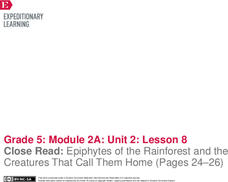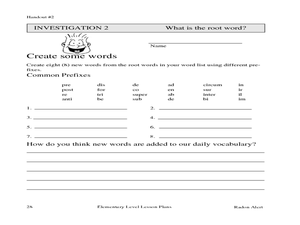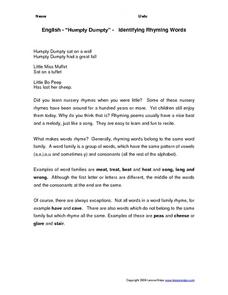Museum of Disability
Stand in My Shoes
Stand in My Shoes, a story by Bob Sornson, is an effective way to teach young learners about empathy and making friends. Once pupils read through the story, they answer a series of discussion questions and complete reading activities...
Helping Dyslexia
Picture Pairs Blends
Challenge your pupils to match words to images with these 29 pairs. Each word includes a consonant blend, either initial or final, and should be matched with its corresponding image either by simply putting two correct cards together or...
Have Fun Teaching
Context Clues (5)
Unfamiliar words can make it difficult to understand what a piece of writing is trying to say. Practice using context clues to define words you don't know with a language arts learning exercise, which features five sentences and enough...
Poetry4kids
How to Write a Fractured Nursery Rhyme
Scholars take a popular song or nursery rhyme and make it their own as they write a fractured nursery rhyme. Writers seek out a nursery rhyme's rhyming words and change them to create an original poem.
Curated OER
Pendemonium: The Italian Job
Discover how to use prefixes and suffixes to determine the meaning of unfamiliar words. The group views a jovial video on the topic, and then they create a chart of prefix and suffix meanings to identify the meanings of words in a social...
Helping Dyslexia
Vowel Sound Posters
Adorn your walls with these posters to support your pupils as they learn various vowel sounds and digraphs. Each poster includes a focus sound (the ai digraph, for example), a large image paired with a word that demonstrates that sound,...
ESL Writing
Paraphrase with Synonyms
What's another word for paraphrasing? Ask your pupils to put their minds to work in order to replace underlined words in a series of sentences with appropriate synonyms.
EngageNY
Understanding Interactions: Launching Pygmalion, Part 1
During a reading of one section of Pygmalion, individuals begin thinking more deeply about identity. They also complete text-dependent questions and a close reading guide.
Novelinks
The Tempest: QAR
Asking questions about a text is an effective way to improve reading comprehension. Apply the Question Answer Response strategy to your unit on William Shakespeare's The Tempest. As kids read each passage, they decide if the answer can...
Center for the Advancement of Ethics and Character
Charlotte's Web: A Story About Friendship
Strengthen the bonds of friendship within your class with a reading of E.B. White's award-winning novel, Charlotte's Web. Focusing on the unique characters in the story and the relationships they develop, young readers draw from their...
Curated OER
The Old Man and the Sea: Questioning Strategies
Readers learn to ask questions about text with an activity based on Ernest Hemingway's The Old Man and the Sea. As they read, class members craft questions based on Bloom's Taxonomy and then find the answers themselves.
North Penn School District
The Catcher in the Rye
Learning more about Holden Caulfield's worldview and state of mind is an integral part of understanding J.D. Salinger's The Catcher in the Rye. A thorough packet of materials pertaining to the unit allow learners to build prior knowledge...
University of North Carolina
Modals
If you could have any job in the world, what would it be? Modal verbs such as could and would express possibility, as the installment of a compilation of informational handouts describes. A series of tables help explain the strength,...
EngageNY
Mid-Unit Assessment: Evidence and Inference in Pygmalion
Scholars complete the Pygmalion mid-unit assessment to show their progress toward the unit's stated goals. The assessment requires learners to read text and successfully answer multiple choice and extended response questions.
EngageNY
Inferring about Character: Getting to Know Percy (Chapters 1 and 2)
What a character! Scholars look at two chapters in The Lightning Thief to make inferences about the character Percy. They record both the character's challenges and responses. Learners then work in their triads to discuss the gist of...
EngageNY
Close Read: Epiphytes of the Rainforest and the Creatures That Call Them Home (Pages 24–26)
It's all connected. Scholars use pages 24-26 of The Most Beautiful Roof in the World to identify the relationship between the plants and animals in the rainforest. They answer and discuss questions about the relationship with a group....
EngageNY
Close Reading: Fishbowl Comparing Atticus and Mr. Gilmer (Chapters 17-19)
Class members participate in two circle group discussions to compare Atticus and Mr. Gilmer in chapters 17-19 of To Kill a Mockingbird. They use a note-catcher to guide their thinking. For homework, readers begin looking at chapters 20-21.
Curated OER
Word Wall Activity List
Second graders perform a variety of activities with a dynamic, ever-changing classroom word wall as outlined in these lessons. They become less dependent on the word wall as the school year progresses.
Curated OER
Minibeasts and Reading Strategies
Fourth graders explore reading strategies through roleplaying. In this reading lesson, 4th graders read Wings, Stings, and Wiggly Things by Martin Jenkins. Student groups pretend to be a law firm and identify words as their evidence to...
Curated OER
Investigation 2: hat is the Root Word?
In this identifying the base words worksheet, students read two columns of words and write their root words, use a dictionary to find new words that use the root words from the word list, and read common prefixes and create new words...
Curated OER
Phrase Card Reading
Fourth graders, after reading and discussing the book, "Tales of a Fourth Grade Nothing," by Judy Bloom, complete a vocabulary worksheet and read sections from the book fluently and accurately. They utilize dictionaries and thesauruses...
Curated OER
English--"Humpty Dumpty"--Identifying Rhyming Words
In this rhyming words worksheet, students read Humpty Dumpty and begin recognizing rhyming words. Students unmix a mixed up batch of words by putting the words in 3 word family columns and list each one underneath one of the families....
Curated OER
Pronoun Exercises: Subject Pronouns and Possessive Adjectives
In this subject pronoun and possessive adjective online worksheet, students complete 10 sentences by choosing the correct subject pronoun from the drop down menu in each sentence. They write the proper subject pronoun and choose the...
Curated OER
Spelling List 6: Sight Words, kn/wr Words, and Academic Vocabulary
In this spelling worksheet, students practice their spelling words that include sight words, kn/wr words, and vocabulary. Students practice spelling 16 words.

























